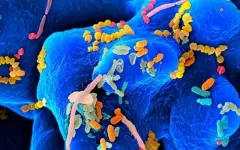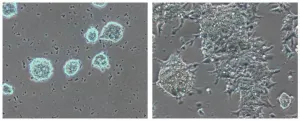(Press-News.org) The evolving science of wisdom rests on the idea that wisdom's defined traits correspond to distinct regions of the brain, and that greater wisdom translates into greater happiness and life satisfaction while being less wise results in opposite, negative consequences.
Scientists have found in multiple studies that persons deemed to be wiser are less prone to feel lonely while those who are lonelier also tend to be less wise. In a new study, published in the March 25, 2021 issue of the journal Frontiers in Psychiatry, researchers at University of California San Diego School of Medicine take the connection between wisdom, loneliness and biology further, reporting that wisdom and loneliness appear to influence -- and/or be influenced by -- microbial diversity of the gut.
The human gut microbiota is comprised of trillions of microbes -- bacteria, viruses, fungi -- that reside within the digestive tract. Researchers have known for a while about the "gut-brain axis," which is a complex network that links intestinal function to the emotional and cognitive centers of the brain.
This two-way communication system is regulated by neural activity, hormones and the immune system; alterations can result in disruptions to stress response and behaviors, said the authors, from emotional arousal to higher-order cognitive abilities, such as decision-making.
Past studies have associated gut microbiota with mental health disorders including depression, bipolar disorder and schizophrenia, as well as personality and psychological traits regarded as key, biologically based components of wisdom. Recent research has connected the gut microbiome to social behavior, including findings that people with larger social networks tend to have more diverse gut microbiotas.
The new Frontiers in Psychiatry study involved 187 participants, ages 28 to 97, who completed validated self-report-based measures of loneliness, wisdom, compassion, social support and social engagement. The gut microbiota was analyzed using fecal samples. Microbial gut diversity was measured in two ways: alpha-diversity, referring to the ecological richness of microbial species within each individual and beta-diversity, referring to the differences in the microbial community composition between individuals.
"We found that lower levels of loneliness and higher levels of wisdom, compassion, social support and engagement were associated with greater phylogenetic richness and diversity of the gut microbiome," said first author Tanya T. Nguyen, PhD, assistant professor of psychiatry at UC San Diego School of Medicine.
The authors said that the mechanisms that may link loneliness, compassion and wisdom with gut microbial diversity are not known, but observed that reduced microbial diversity typically represents worse physical and mental health, and is associated with a variety of diseases, including obesity, inflammatory bowel disease and major depressive disorder.
A more diverse gut microbiota may be less susceptible to invasion by outside pathogens, which could contribute to and help promote better resilience and stability of the community.
"It is possible that loneliness may result in decreased stability of the gut microbiome and, consequently, reduced resistance and resilience to stress-related disruptions, leading to downstream physiological effects, such as systemic inflammation," the authors wrote.
"Bacterial communities with low alpha-diversity may not manifest overt disease, but they may be less than optimal for preventing disease. Thus, lonely people may be more susceptible to developing different diseases."
The relationship between loneliness and microbial diversity was particularly strong in older adults, suggesting that older adults may be especially vulnerable to health-related consequences of loneliness, which is consistent with prior research.
Conversely, the researchers said that social support, compassion and wisdom might confer protection against loneliness-related instability of the gut microbiome. Healthy, diverse gut microflora may buffer the negative effects of chronic stress or help shape social behaviors that promote either wisdom or loneliness. They noted that animal studies suggest that gut microbiota may influence social behaviors and interactions, though the hypothesis has not been tested in humans.
The complexity of the topic and study limitations, such as the absence of data about individuals' social networks, diet and degree of objective social isolation versus subjective reports of loneliness, argue for larger, longer studies, wrote the authors.
"Loneliness may lead to changes in the gut microbiome or, reciprocally, alterations of the gut milieu may predispose an individual to become lonely," said Dilip V. Jeste, MD, Distinguished Professor of Psychiatry and Neurosciences at UC San Diego School of Medicine and senior author of the paper. "We need to investigate much more thoroughly to better understand the phenomenon of the gut-brain axis."
INFORMATION:
Co-authors include: Xinlian Zhang, Tsung-Chin Wu, Jinyuan Liu, Collin Le, Xin M. Tu and Rob Knight, all at UC San Diego.
An analysis of adult human brain tissue reveals over 900 proteins tied to epilepsy. The brain disorder, estimated to afflict more than 3 million Americans, is mostly known for symptoms of hallucinations, dreamlike states, and uncontrolled, often disabling bodily seizures.
Led by researchers at NYU Grossman School of Medicine, the study examined molecular differences among the brains of 14 epilepsy patients and another group of 14 adults of similar age and gender who did not have the disease.
Study results showed that altered levels of brain proteins predominated in the hippocampus, a structure located deep inside ...
Researchers from Charité - Universitätsmedizin Berlin and the Francis Crick Institute have developed a mass spectrometry-based technique capable of measuring samples containing thousands of proteins within just a few minutes. It is faster and cheaper than a conventional blood count. To demonstrate the technique's potential, the researchers used blood plasma collected from COVID-19 patients. Using the new technology, they identified eleven previously unknown proteins which are markers of disease severity. The work has been published in Nature Biotechnology*.
Thousands of proteins are active inside the human body at any given time, providing its structure and enabling reactions which are essential to life. The body raises and lowers the activity ...
Expectant women are more likely to give birth early if they have high blood levels of a chemical used in flame retardants compared with those who have limited exposure, a new study finds.
These polybrominated diphenyl ethers (PBDEs) are used in the manufacture of furniture, carpeting, and other products to reduce flammability. Previous studies have found that the substances can leach into household dust and build up in the body where they may interfere with the thyroid, an organ that secretes brain-developing hormones. Childhood exposure to PBDEs has been linked to learning disabilities, autistic ...
Millions of years ago, aphid-like insects called whiteflies incorporated a portion of DNA from plants into their genome. A Chinese research team, publishing March 25th in the journal Cell, reveals that whiteflies use this stolen gene to degrade common toxins plants use to defend themselves against insects, allowing the whitefly to feed on the plants safely.
"This seems to be the first recorded example of the horizontal gene transfer of a functional gene from a plant into an insect," says co-author Ted Turlings (@FARCE_lab), a chemical ecologist and entomologist ...
Octopuses are known to sleep and to change color while they do it. Now, a study publishing March 25 in the journal iScience finds that these color changes are characteristic of two major alternating sleep states: an "active sleep" stage and a "quiet sleep" stage. The researchers say that the findings have implications for the evolution of sleep and might indicate that it's possible for octopuses to experience something akin to dreams.
Scientists used to think that only mammals and birds had two sleep states. More recently, it was shown that some reptiles also show non-REM and REM sleep. A REM-like sleep state was reported ...
More than half of the opioid tablets prescribed for patients who underwent orthopaedic or urologic procedures went unused in a new study by researchers at the Perelman School of Medicine at the University of Pennsylvania. Using an automated text messaging system that regularly checked in with patients on their pain and opioid use, the study also showed that most opioids are taken within the first few days following a procedure and may not be necessary to manage pain even just a week following a procedure. The study was published today in JAMA Network Open.
"Through simple text messaging we highlight a method which gives clinicians the information they need to reduce prescribing and manage ...
BOSTON - In the largest study of its kind to date, researchers at Massachusetts General Hospital, Brigham and Women's Hospital and the Ragon Institute of MGH, MIT and Harvard have found the new mRNA COVID-19 vaccines to be highly effective in producing antibodies against the SARS-CoV-2 virus in pregnant and lactating women. They also demonstrated the vaccines confer protective immunity to newborns through breastmilk and the placenta.
The study, published in the American Journal of Obstetrics and Gynecology (AJOG), looked at 131 women of reproductive age (84 pregnant, 31 lactating and 16 non-pregnant), ...
Chronic side effects among melanoma survivors after treatment with anti-PD-1 immunotherapies are more common than previously recognized, according to a study published March 25 in JAMA Oncology.
The chronic complications, which occurred in 43% of patients, affected the joints and endocrine system most commonly, and less often involved salivary glands, eyes, peripheral nerves and other organs. These complications may be long lasting, with only 14% of cases having been resolved at last follow-up. This finding contrasted with previously reported immunotherapy-related acute complications that affected visceral organs -- including the liver, colon, lungs and kidneys -- which were effectively treated with steroids. However, the vast ...
Pregnant women who consumed the caffeine equivalent of as little as half a cup of coffee a day on average had slightly smaller babies than pregnant women who did not consume caffeinated beverages, according to a study by researchers at the National Institutes of Health. The researchers found corresponding reductions in size and lean body mass for infants whose mothers consumed below the 200 milligrams of caffeine per day--about two cups of coffee--believed to increase risks to the fetus. Smaller birth size can place infants at higher risk of obesity, heart ...
Scientists at the Proteomics Core Unit of the Spanish National Cancer Research Centre (CNIO), headed by Javier Muñoz, have described the mechanisms, unknown to date, involved in maintaining embryonic stem cells in the best possible state for their use in regenerative medicine. Their results, published in Nature Communications, will help to find novel stem-cell therapies for brain stroke, heart disease or neurodegenerative conditions like Alzheimer's or Parkinson's disease.
Naïve pluripotent stem cells, ideal for doing research
Embryonic stem cells (ESCs) are pluripotent cells that can grow ...



